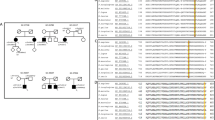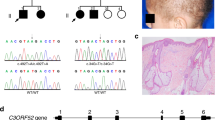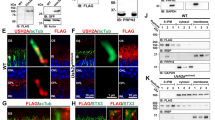Abstract
Congenital hypotrichosis associated with juvenile macular dystrophy (HJMD; MIM601553) is an autosomal recessive disorder of unknown etiology, characterized by hair loss heralding progressive macular degeneration and early blindness1,2. We used homozygosity mapping in four consanguineous families to localize the gene defective in HJMD to 16q22.1. This region contains CDH3, encoding P-cadherin, which is expressed in the retinal pigment epithelium and hair follicles. Mutation analysis shows in all families a common homozygous deletion in exon 8 of CDH3. These results establish the molecular etiology of HJMD and implicate for the first time a cadherin molecule in the pathogenesis of a human hair and retinal disorder.
This is a preview of subscription content, access via your institution
Access options
Subscribe to this journal
Receive 12 print issues and online access
$209.00 per year
only $17.42 per issue
Buy this article
- Purchase on Springer Link
- Instant access to full article PDF
Prices may be subject to local taxes which are calculated during checkout


Similar content being viewed by others

References
Souied, E. et al. Ophthalmic Genet. 16, 11–15 (1995).
Da Cruz, L. & McAllister, I.L. Br. J. Ophthalmol. 85, 239 (2001).
Qumsiyeh, M.B., Dasouki M.J. & Teebi, A.S. in Genetic Disorders among Arab Populations (eds. Teebi, A.S. & Farag, T.I.) 232 (Oxford University, Oxford, 1997).
Kruglyak, L., Daly, M.J. & Lander, E.S. Am. J. Hum. Genet. 56, 519–527 (1995).
Muller-Rover, S. et al. Exp. Dermatol. 8, 237–246 (1999).
Riehl, R. et al. Neuron 17, 837–848 (1996).
Yagi, T. & Takeichi, M. Genes Dev. 14, 1169–1180 (2000).
Burke, J.M., Cao, F., Irving, P.E. & Skumatz, C.M. Invest. Ophthalmol. Vis. Sci. 40, 2963–2970 (1999).
Ahmed, Z.M. et al. Am. J. Hum. Genet. 69, 25–34 (2001).
Bolz, H. et al. Nature Genet. 27, 108–112 (2001).
Lewis, J.E., Jensen, P.J. & Wheelock, M.J. J. Invest. Dermatol. 102, 870–877 (1994).
Chen, G.T., Getsios, S. & MacCalman, C.D. Endocrine 9, 263–267 (1998).
Radice, G.L. et al. J. Cell Biol. 139, 1025–1032 (1997).
Huelsken, J., Vogel, R., Erdmann, B., Cotsarelis, G. & Birchmeier, W. Cell 105, 533–545 (2001).
Gat, U., DasGupta, R., Degenstein, L. & Fuchs, E. Cell 95, 605–614 (1998).
Acknowledgements
We gratefully acknowledge the participation of all HJMD family members in our study. We thank I. Minkov, N. Resnick and D. Kornitzer for assistance and helpful discussions.
Author information
Authors and Affiliations
Corresponding author
Rights and permissions
About this article
Cite this article
Sprecher, E., Bergman, R., Richard, G. et al. Hypotrichosis with juvenile macular dystrophy is caused by a mutation in CDH3, encoding P-cadherin. Nat Genet 29, 134–136 (2001). https://doi.org/10.1038/ng716
Received:
Accepted:
Published:
Issue Date:
DOI: https://doi.org/10.1038/ng716
This article is cited by
-
Pathogenic variants in CDH11 impair cell adhesion and cause Teebi hypertelorism syndrome
Human Genetics (2021)
-
Hypotrichosis with cone-rod dystrophy in a patient with cadherin 3 (CDH3) mutation
Documenta Ophthalmologica (2019)
-
Genetic Hair Disorders: A Review
Dermatology and Therapy (2019)
-
New CDH3 mutation in the first Spanish case of hypotrichosis with juvenile macular dystrophy, a case report
BMC Medical Genetics (2017)
-
CDHR1 mutations in retinal dystrophies
Scientific Reports (2017)


